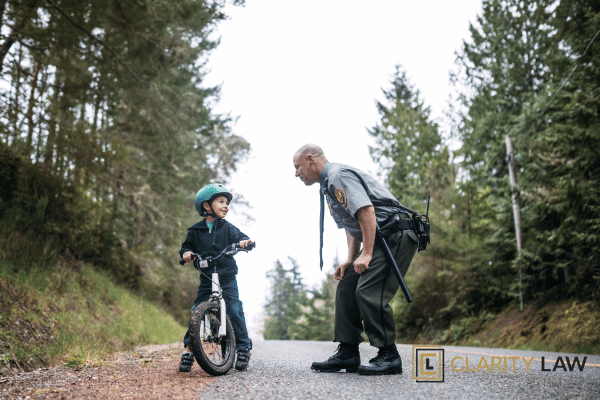
Introduction
It is always a highly stressful situation when police want to talk to your child about an offence. This article will hopefully give you a brief overview of the factors to consider in Queensland.
Should my child talk to police?
The answer is ‘maybe’.
The case for ‘no’.
A defence solicitor’s reflexive advice is often to tell a suspect to give a ‘no comment’ interview. What this means is, the person tells police (either personally or through a solicitor) that they do not want to answer any questions in an interview. If police ignore this and try to plough on with an interview anyway, that interview would not be allowed to be used as evidence against the person.
People are sometimes concerned that not speaking to police will make things worse for them. However, the law specifically says a person is not to be punished simply for refusing to speak to police or incriminate themselves. This is called the ‘right to silence’.
Police approaches to interviews will generally be friendly, with such comments as ‘I just want to hear your side of it’ or ‘I’m just trying to figure this thing out and I am hoping you can help me’. This gives the suspect the illusion he is being helpful and the police want to help him, when in reality he is just giving police more ammunition to use against him. When a person is suspected of criminal offending by police, honesty is usually not the best policy.
The case for ‘yes’.
The case for children is different from adults. The law says that if a child gives a confession, then police should consider other options besides prosecution. However, if the child refuses an interview, then the police are left with no option but to bring charges.
The Queensland Police Operation Procedures Manual states “where a prima facie case is established against a child in relation to an offence, officers should, wherever practicable, divert the child from the court system, unless the nature of the offence and the child’s criminal history indicate a proceeding for the offence should be commenced.”
The Manual identifies that police must consider alternatives to commencing court proceedings, including:
-
taking no formal action,
-
administering a caution,
-
referring the matter to a restorative justice process,
-
offering the child the opportunity to attend a drug diversion assessment program (for a drug related offence),
-
for an offence of being intoxicated in a public place, take and release the child at a place of safety.
Importantly, for the purposes of this article, the Manual says:
Before a caution or other diversion action can be taken against a child, the child must:
-
admit to committing the offence to the police officer and
-
consent to the caution or other diversion action.
If a child does not admit to the offence, diversion options are not available.
In other words, for a child to avoid being charged and having the matter sent to court, the child must admit to committing the offence. This is obviously relevant to an interview, because if the child refuses to take part in an interview, then diversion options such as cautions are not available to the police.
Obviously, if your child did not commit an offence, he or she should not be admitting to it.
It still may be a bad idea to give an interview.
Although police are required to consider alternatives to formal prosecution when a child admits an offence, they are not obliged to avoid formal charges. If the alleged offence is serious or the child already has criminal history, they may proceed to prosecution anyway. Then, a confessional interview has most likely hurt, rather than helped.
For example, if a child is suspected of a home invasion, armed robbery, or other serious offence, even if it is her first interaction with police, police are likely to prosecute even if the child admits the offence. Likewise, police tend to charge drink and drug driving offences for children, even those with no traffic history.
So, what should you do?
As can be seen, whether your child should speak to police is really guided by the particular circumstances of his or her alleged conduct. A overview like this can only ever be general in nature, and that is why it is important to get expert legal advice so we can consider all the relevant information, and potentially speak to police about the matter. If the police contact you about wanting to talk to your child ring a lawyer before you do anything.
Disclaimer
This article is an outline and is not legal advice. If police want to speak to you or your child about an alleged offence, please seek legal advice from a solicitor who specialises in criminal law. Also this article only applies to the situation in Queensland.
How do I get more information or engage you to act for me?
If you want to engage us or just need further free information or advice then you can either;
-
Use our contact form and we will contact you by email or phone at a time that suits you
-
Call us on 1300 952 255 seven days a week, 7am to 7pm
-
Click here to select a time for us to have a free 15 minute telephone conference with you
-
Email the firms founder on This email address is being protected from spambots. You need JavaScript enabled to view it.
-
Click the help button at the bottom right and leave us a message
We are a no pressure law firm, we are happy to provide free initial information to assist you. If you want to engage us then great, we will give you a fixed price for our services so you will know with certainty what we will cost. All the money goes into a trust account monitored by the Queensland Law Society and cannot be taken out without your permission or until we are legally allowed to.






